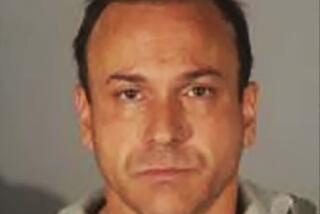Feds paroled Garrido after a 35-minute interview
Phillip Garrido, the man accused of kidnapping and sexually assaulting Jaycee Lee Dugard, was paroled by the federal government two decades ago after a 35-minute jailhouse interview in which he spoke of his crime, his prison experience and future plans, the U.S. Parole Commission said Friday.
Garrido, charged with abducting Dugard 18 years ago, was released from federal custody after serving only 10 1/2 years of his 50-year sentence for a 1976 kidnapping.
Cranston Mitchell, vice chairman of the U.S. Parole Commission, said two commission examiners met with Garrido in Lompoc, Calif., on Nov. 5, 1987, to discuss his possible parole.
Neither the federal prosecutor nor Garrido’s defense lawyer attended the hearing, and the examiners may not have seen psychiatric reports on Garrido, Mitchell said.
They also may not have reviewed Garrido’s trial record, Mitchell said. Transcripts would have showed Garrido said he had exposed himself to young girls and masturbated outside schools.
The prosecutor said another woman also identified him as the hippie-looking man who tried to kidnap her an hour before he succeeded in kidnapping the other woman.
Reading a summary of the parole report, Mitchell said Garrido planned to return to live with his mother in California. He had only two prior convictions, Mitchell said. Both were for marijuana possession in California in 1970 and 1972, and he was not incarcerated for the offenses, Mitchell said.
Garrido also had been arrested on suspicion of drugging and raping a 14-year-old girl in 1972, but she declined to press charges, authorities said this week.
The examiners also considered his prison experience. In an earlier bid for release, Garrido had blamed marijuana and LSD use for his crime, and said he had earned a high school diploma and learned carpentry and drafting behind bars.
“He was an average inmate,” Mitchell said. “There were no major issues.”
Two weeks later, the parole commission received the examiners’ unanimous recommendation and voted to parole Garrido to a Nevada state prison to complete a sentence for raping the kidnap victim, a state offense.
A numerical formula used to determine an inmate’s suitability for parole indicated Garrido should be released, Mitchell said.
That formula included scores for such factors as obtaining a high school diploma and the inmate’s age when first imprisoned.
Garrido’s score, which was used as a guideline by the government, showed he had been suitable for parole almost two years earlier, Mitchell said. But under the law at the time, Garrido was required to serve at least 10 years.
Federal parole was abolished in 1987, but the termination did not affect inmates already serving sentences.
The handling of Garrido was typical of the “old-fashioned parole system” that was overhauled by Congress in 1984, when sentences became longer and mandatory, with little judicial discretion, said Stanford Law Professor Robert Weisberg, who specializes in criminal law.
Under today’s laws, Garrido probably would have served 20 to 40 years, Weisberg said. Today’s parole boards also have more sophisticated ways to measure an inmate’s risk to the public, he said.
In deciding to parole Garrido, the presidential appointees on the commission would have taken into account that Garrido had a potential life sentence to serve in Nevada state prison, Mitchell said.
Leland E. Lutfy, who prosecuted Garrido for the kidnapping, said the state judge who sentenced Garrido to serve a five-years-to-life sentence for rape concurrently with the federal sentence did so after being misinformed by the state prosecutor that Garrido would have to serve two-thirds of his federal sentence.
After Garrido entered Nevada state prison in January 1988, the Nevada state parole commission voted 3 to 2 to release him on Aug. 1, 1988.
A Nevada parole spokeswoman was unavailable Friday, but the Reno Gazette-Journal reported that the state board considered Garrido a “moderate” risk because he had never served jail time.
The newspaper reported that Garrido had been incarcerated in a Contra Costa County minimum detention “farm” for a 1969 drug conviction, which would have made him a high risk had the board known of it.
Three years after his release, Garrido is suspected of kidnapping Dugard from South Lake Tahoe, where he had kidnapped the 1976 victim.
The California Department of Corrections and Rehabilitation supervised Garrido for the federal government. But the agent who was assigned to him did not discover Dugard and her two daughters living on Garrido’s property. The agent supervised about 40 parolees, officials said.
“Forty is a nice size” for a parole caseload, said Mitchell, who ran the parole system in Missouri for 18 years and formerly worked as a police officer. “Most places would love to have 40.”
He said some parole agents are responsible for as many as 100 parolees.
Parole work is “driven by suspicion,” Mitchell said. “And a lot of it is driven by their history -- not so much the type of crime -- but the history. For this particular individual, he didn’t have any history” on paper because law enforcement considered only Garrido’s prior convictions, not his admissions at trial.
Gordon Hinkle, a spokesman for the California Department of Corrections and Rehabilitation, declined to identify the agent who supervised Garrido.
Hinkle said the department is reviewing parole procedures as a result of the Garrido case, but stressed that his parole agent was not under any type of investigation.
--
More to Read
Sign up for Essential California
The most important California stories and recommendations in your inbox every morning.
You may occasionally receive promotional content from the Los Angeles Times.











